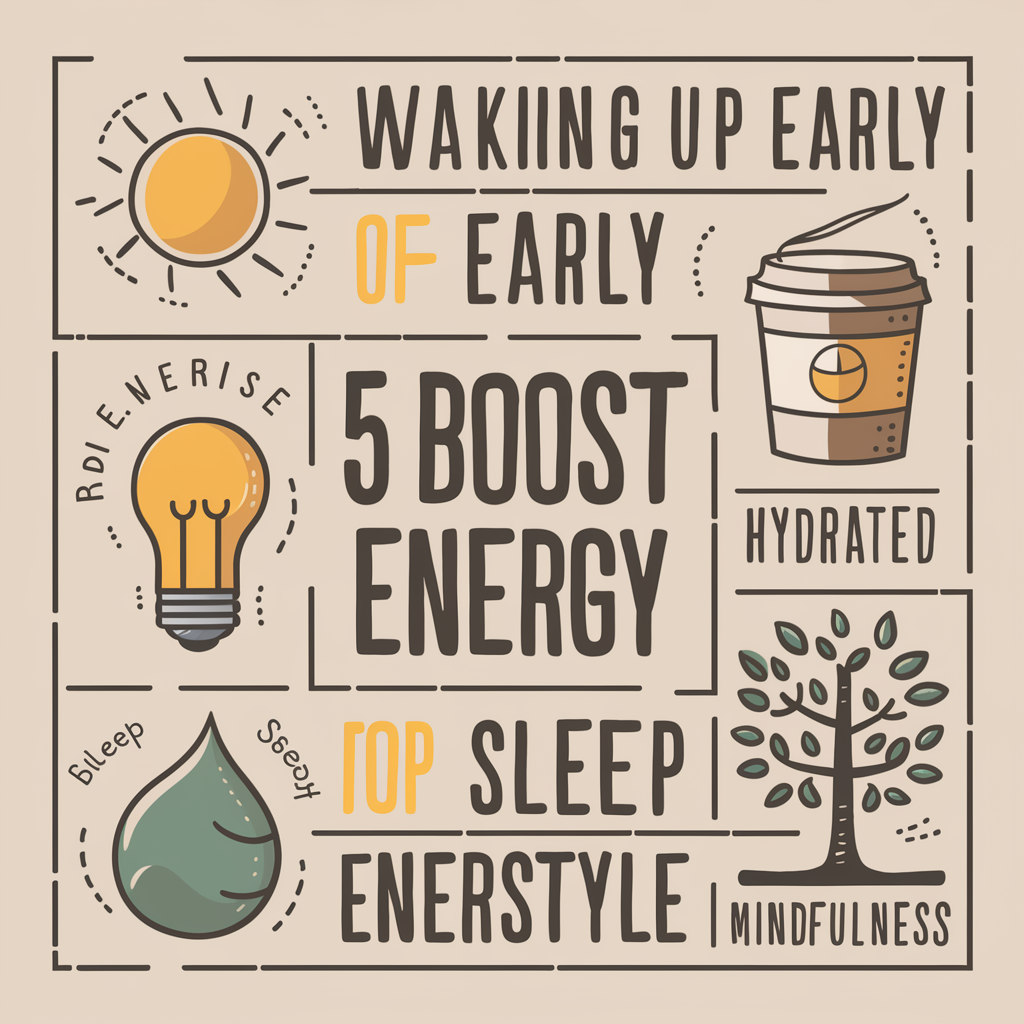Five Simple Habits to Boost Your Daily Energy Levels
Ever found yourself staring at the clock, willing it to move faster, while you struggle to keep your eyelids from staging a mutiny? We’ve all been there—sitting at our desks, desperately trying to muster the energy to power through the afternoon slump. It’s as if our bodies have conspired against us, leaving us feeling like a deflated balloon. But fear not! There are simple habits that can reinvigorate your daily energy levels, allowing you to tackle the day with gusto. Here’s a closer look at five of them.
1. Embrace the Power of Hydration
Let’s start with something straightforward, yet often overlooked. Water is the elixir of life, and trust me, it’s just as crucial for your energy levels as it is for your skin and organs. Picture this: your body is like a well-oiled machine, and water is the oil that keeps it running smoothly. Dehydration can lead to fatigue, sluggishness, and that dreadful brain fog that makes you feel like you’re wading through molasses.
Studies suggest that even mild dehydration can impair your cognitive performance and mood. I remember when I used to think coffee was the answer to everything—until I realized I was merely trading one form of fatigue for another. So, how much water should you actually be drinking? While the old “eight glasses a day” rule is a good starting point, factors like your activity level, climate, and personal health can influence your needs. As a rough guideline, aim for about half your body weight in ounces daily. For example, if you weigh 160 pounds, that’s about 80 ounces—roughly ten 8-ounce glasses. And if you’re sweating it out at the gym, toss in a few extra ounces to stay ahead of the game.
2. Prioritize Quality Sleep
Ah, sleep—the ultimate energy booster. If you’ve ever pulled an all-nighter, you know how quickly your energy levels plummet the next day. Sleep isn’t just a luxury; it’s a necessity for optimal energy. Did you know that adults typically need between 7 to 9 hours of sleep each night? Yet, many of us settle for a mere five or six. (I’ve been guilty of this myself, staying up way too late binge-watching shows that I swear I’d only watch “one more episode” of.)
To improve your sleep quality, consider establishing a bedtime routine. This isn’t just for kids—adults benefit from rituals, too. Try dimming the lights an hour before bed, avoiding screens (yes, I know it’s tough), and perhaps indulging in a calming activity like reading or meditating. Some people find that a warm cup of herbal tea helps signal to their bodies that it’s time to wind down. The key is to create a sleep environment that’s conducive to rest—think cool, dark, and quiet. And don’t forget to keep the bedroom for sleep and intimacy only; working or scrolling through social media in bed can muddle those signals.
3. Fuel Your Body with Nutritious Foods
It’s no secret that what we eat plays a significant role in how we feel. Think of your body as a high-performance sports car. You wouldn’t fill it with low-grade fuel, right? Similarly, your body needs the right nutrients to function optimally. A diet rich in whole foods—like fruits, vegetables, lean proteins, and whole grains—can provide the energy you need to power through your day.
Now, I’m not advocating for a life of kale and quinoa (unless that’s your jam, in which case, go for it!). Instead, focus on incorporating a variety of colorful foods into your meals. This not only makes your plate look appealing but also ensures you’re getting a range of vitamins and minerals. For instance, bananas are famous for their potassium, which can help prevent muscle cramps, while nuts and seeds provide healthy fats that keep you satiated. And let’s not forget about the mighty complex carbohydrates found in whole grains, which provide sustained energy rather than the quick spike followed by a crash that comes from sugary snacks (hello, afternoon slump!).
Don’t underestimate the power of a well-balanced breakfast, either. I’ve often noticed that on days when I skip breakfast, my energy dips significantly by mid-morning. A hearty breakfast featuring protein, fiber, and healthy fats can set a positive tone for the rest of the day. Think oatmeal topped with berries and a dollop of nut butter or eggs with avocado and whole-grain toast. Your body will thank you!
4. Get Moving with Regular Exercise
Exercise might seem like an odd recommendation when you’re trying to boost your energy levels. After all, who wants to expend energy when they’re already feeling drained? But here’s the kicker: physical activity actually increases your overall energy levels. It’s like a paradox wrapped in a riddle—once you get moving, you often feel more energized.
Whether it’s a brisk walk during your lunch break or a full workout session at the gym, find an activity you enjoy. If you’re not a fan of running (and trust me, I get it), try dancing, swimming, or even gardening! The goal is to get your heart rate up and your blood flowing. Studies have shown that regular exercise can enhance your mood and reduce feelings of fatigue, making it easier to tackle your daily tasks.
One trick I’ve found incredibly helpful is to schedule short bursts of activity throughout the day. That could mean setting a timer to remind yourself to stand up, stretch, or do a few jumping jacks every hour. These little breaks can rejuvenate your mind and body, making you feel more alert and focused. Plus, it’s a great excuse to step away from the computer screen every so often. Bonus points if you can convince a coworker to join you—having a buddy makes it more fun!
5. Practice Mindfulness and Stress Management
Finally, let’s talk about the elephant in the room: stress. It’s a common energy drainer that many of us grapple with daily. The demands of work, family, and life can leave us feeling overwhelmed, and chronic stress can lead to fatigue and burnout. That’s why practicing mindfulness and stress management techniques is essential for maintaining high energy levels.
Mindfulness—simply put—is about being present in the moment. It can take many forms, from meditation and deep breathing exercises to yoga and journaling. I remember when I first started meditating; I thought it was silly to sit in silence. But over time, I began to appreciate the clarity and calmness it brought to my mind. Even just a few minutes of deep breathing can help center you and alleviate stress. So, the next time you’re feeling frazzled, try taking a few deep breaths, inhaling through your nose and exhaling through your mouth. You might be surprised at how much better you feel!
Incorporating stress management techniques into your daily routine can have a profound impact on your energy levels. Find what works for you, whether it’s spending time in nature, listening to music, or practicing gratitude by jotting down things you’re thankful for. These small acts can cultivate a more positive mindset, allowing you to navigate life’s challenges with grace.
Conclusion: A Journey, Not a Destination
Boosting your daily energy levels doesn’t have to be a monumental feat. By integrating these five simple habits into your life—staying hydrated, prioritizing sleep, nourishing your body with wholesome foods, staying active, and managing stress—you can create a sustainable routine that promotes both physical and mental vitality. The journey to higher energy levels is a personal one, and there’s no one-size-fits-all solution.
As you embark on this journey, remember to be patient with yourself. Change takes time, and it’s okay to have off days. Life can throw curveballs, and sometimes you might find yourself back at square one. Just don’t forget that every small step counts. So grab that glass of water, put on your favorite playlist, and get moving. Your future self will thank you!
Here’s to a more energized you!






